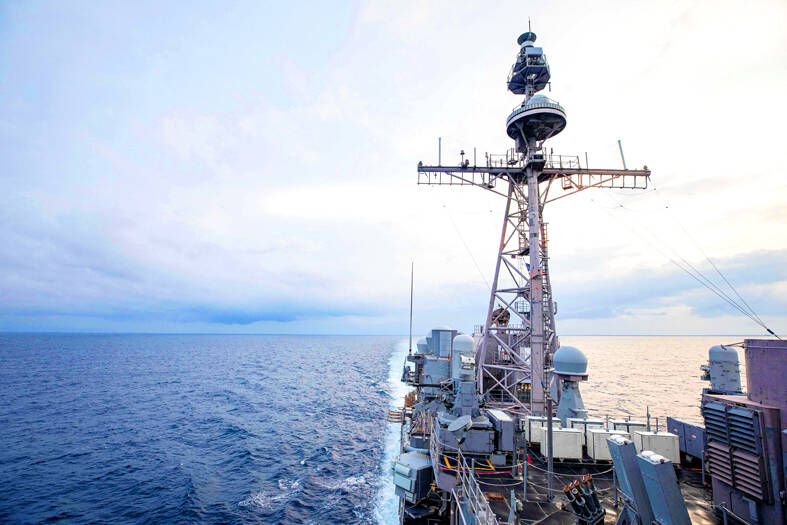Two US warships yesterday sailed through the Taiwan Strait, the US Navy said, the first such transit since China staged unprecedented military drills around Taiwan, which the Ministry of National Defense said are still ongoing.
In a statement, the US Navy said the transit “demonstrates the United States’ commitment to a free and open Indo-Pacific.”
Tensions in the Strait soared to their highest level in years after US House of Representatives Speaker Nancy Pelosi visited Taipei from Aug. 2 to 3.

Photo: AFP / Justin Stack / US NAVY
Beijing reacted furiously, staging days of air and sea exercises around Taiwan. Taipei condemned the drills and missile tests as preparation for an invasion.
The Ministry of National Defense said it detected 23 Chinese aircraft and eight Chinese ships operating around Taiwan yesterday.
That included seven Chinese aircraft that crossed the median line of the Strait, which normally acts as an unofficial barrier between the two sides, it added.
The US Seventh Fleet said a pair of Ticonderoga-class guided-missile cruisers — the USS Antietam and the USS Chancellorsville — conducted a “routine” transit yesterday “through waters where high seas freedoms of navigation and overflight apply in accordance with international law.”
“These ships transited through a corridor in the Strait that is beyond the territorial sea of any coastal state,” a US Navy statement said. “The United States military flies, sails and operates anywhere international law allows.”
The Chinese People’s Liberation Army (PLA) said the US had “openly hyped up” the ships’ passage through the Strait.
“The PLA Eastern Theater Command is following and warning the US vessels throughout their entire journey, and is aware of all movements,” theater command spokesman Senior Colonel Shi Yi (施毅) said.
“Troops in the [eastern] theater remain on high alert and are prepared at all times to foil any provocations,” he said.
The Ministry of National Defense confirmed a pair of warships sailed from north to south through the channel.
“During their southward journey through the Taiwan Strait, the military is fully monitoring relevant movements in our surrounding sea and airspace, and the situation is normal,” it said.
The Seventh Fleet is based in Japan and is a core part of Washington’s navy presence in the Pacific.
The US and Western allies have increased “freedom of navigation” crossings by naval vessels of the Taiwan Strait and the South China Sea to reinforce that those seas are international waterways, sparking anger from Beijing.
Washington has said its position on Taiwan remains unchanged and has accused China of threatening peace in the Strait and using Pelosi’s visit as a pretext for military exercises.
Pelosi’s visit to Taiwan was followed about a week later by a group of five other US lawmakers, with China’s military responding by carrying out more exercises near Taiwan.
US Senator Marsha Blackburn, a member of US Senate’s commerce and armed services committees, arrived in Taiwan on Thursday in the third visit by a US dignitary this month, defying pressure from China to halt the trips.
Additional reporting by Reuters

MAKING WAVES: China’s maritime militia could become a nontraditional threat in war, clogging up shipping lanes to prevent US or Japanese intervention, a report said About 1,900 Chinese ships flying flags of convenience and fishing vessels that participated in China’s military exercises around Taiwan last month and in January last year have been listed for monitoring, Coast Guard Administration (CGA) Deputy Director-General Hsieh Ching-chin (謝慶欽) said yesterday. Following amendments to the Commercial Port Act (商港法) and the Law of Ships (船舶法) last month, the CGA can designate possible berthing areas or deny ports of call for vessels suspected of loitering around areas where undersea cables can be accessed, Oceans Affairs Council Minister Kuan Bi-ling (管碧玲) said. The list of suspected ships, originally 300, had risen to about

DAREDEVIL: Honnold said it had always been a dream of his to climb Taipei 101, while a Netflix producer said the skyscraper was ‘a real icon of this country’ US climber Alex Honnold yesterday took on Taiwan’s tallest building, becoming the first person to scale Taipei 101 without a rope, harness or safety net. Hundreds of spectators gathered at the base of the 101-story skyscraper to watch Honnold, 40, embark on his daredevil feat, which was also broadcast live on Netflix. Dressed in a red T-shirt and yellow custom-made climbing shoes, Honnold swiftly moved up the southeast face of the glass and steel building. At one point, he stepped onto a platform midway up to wave down at fans and onlookers who were taking photos. People watching from inside

Japan’s strategic alliance with the US would collapse if Tokyo were to turn away from a conflict in Taiwan, Japanese Prime Minister Sanae Takaichi said yesterday, but distanced herself from previous comments that suggested a possible military response in such an event. Takaichi expressed her latest views on a nationally broadcast TV program late on Monday, where an opposition party leader criticized her for igniting tensions with China with the earlier remarks. Ties between Japan and China have sunk to the worst level in years after Takaichi said in November that a hypothetical Chinese attack on Taiwan could bring about a Japanese

STREAMLINED: The dedicated funding would allow the US to transfer equipment to Taiwan when needed and order upgraded replacements for stockpiles, a source said The US House of Representatives on Thursday passed a defense appropriations bill totaling US$838.7 billion, of which US$1 billion is to be allocated to reinforcing security cooperation with Taiwan and US$150 million to replace defense articles provided to the nation. These are part of the Consolidated Appropriation Act, which the US House yesterday passed with 341 votes in favor and 88 against. The act must be passed by the US Senate before Friday next week to avoid another government shutdown. The US House Committee on Appropriations on Monday unveiled the act, saying that it allocates US$1 billion for the Taiwan Security Cooperation Initiative